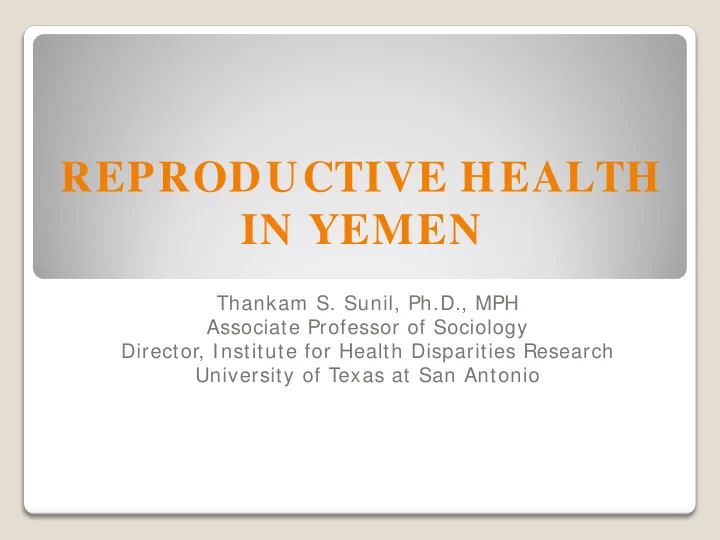

REPRODUCTIVE HEALTH IN YEMEN Thankam S. Sunil, Ph.D., MPH Associate Professor of Sociology Director, Institute for Health Disparities Research University of Texas at San Antonio
Background Characteristics, 2011 Total population: 24,133,492 Life expectancy: 63.7 years Age structure: 0-14 years: 43% Male: 61.7 years 15-64 years: 54.4% Female: 65.9 years 65+ years: 2.6% TFR: 4.63 Population growth rate: 2.65% Literacy: 50.2% Birth rate: 33.5/1,000 Male: 70.5% Death rate: 7.02/1,000 Female: 30% (2003 est.) Sex ratio: 1.05 males/female Unemployment: 35% IMR: 55.1/1,000 live births Source: CIA World Factbook
Reproductive Health: Complex demographic phenomenon Takes into account multitude of factors Provides a holistic approach to population health
Reproductive Health: “a state of complete physical, mental and social well-being and not merely the absence of disease or infirmity in all matters relating to the reproductive system and to its functions and processes” (UN, 1994)
Three Broad Dimensions Able to have satisfying and safe sex life and they have the capability to reproduce and the freedom to decide if, when and how often to do so. Have access to safe, effective, affordable and acceptable choice of family planning methods. Access to appropriate healthcare services that will enable women to go safely through pregnancy and childbirth and provide couples with the best chance of having a healthy infant.
Able to have satisfying and safe sex life and the capability to reproduce and the freedom to decide if, when and how often to do so. Marriage law Age at marriage Adult illiteracy Abortion law Gender inequality
Marriage Law North Yemen – 15 and South Yemen - 16 Legal age at marriage was 15 until 1999 Currently there is no legal age at marriage Nearly half of young women marry before age 20 Growing proportion of mothers prefer their daughters to marry at a later age
Cumulative Percent Married by Age 100 90 80 70 60 50 40 30 20 10 0 9 19 29 39 Age at marriage 1991 1997
Percent Illiterate by Gender 90 80 70 60 50 40 30 20 10 0 1991/ 1992 1999 2002 Male Female Total
Gender Inequality Index 0.47 0.46 0.45 0.44 0.43 0.42 0.41 0.4 0.39 0.38 0.37 1998 2002 2006
Abortion Law Restricted in Yemen Cannot be performed in public health facilities Allowed in specific situations ◦ Save a woman’s life ◦ Victim of rape ◦ Congenital abnormality of fetus
Have access to safe, effective, affordable and acceptable methods of family planning of their choice Proportion not using contraceptives Use of any modern methods Unmet need for family planning
Never Used Any Method 100 94.3 1991/ 92 1997 2006 90 84.2 78.9 80 71.8 70 64 57.7 60 50 40 30 20 10 0 Urban Rural
Use of Modern Methods 40 1991/ 92 1997 2006 33.7 35 30 25 21.2 18.8 20 15 12.7 10 6.1 3.3 5 0 Rural Urban
Unmet Need for Family Planning 45 40.3 1997 2006 40 33.3 35 28 30 25 20 13.8 15 10 5 0 Urban Rural
Access to appropriate healthcare services that will enable women to go safely through pregnancy and childbirth and provide couples with the best chance of having a healthy infant Births at a health facility Antenatal care Traditional birth attendants Infant mortality Maternal mortality
Births at a Health Facility 45 1991/ 92 1997 2006 40.3 40 35 31.7 30.3 30 25 20 17.4 15 11.3 10 8 5 0 Rural Urban
No Antenatal Care 80 74.4 71.2 70 59.3 60 50 37 36.9 40 27.9 30 20 10 0 Urban Rural 1991/92 1997 2006
Assistance from Traditional Birth Attendants 25 23.4 1997 2006 20 14.1 15 10 8.7 6.7 5 0 Urban Rural
Infant Mortality* 100 1994 1999 2005 2009 87.59 90 81.6 81.68 75.9 80 75.48 70.55 69.92 70 65.39 63.18 59.98 58.4 60 53.39 50 40 30 20 10 0 Male Female Total *per 1,000 live births
Maternal Mortality* 500 450 400 350 300 250 200 150 100 50 0 1997 2005 2009 *per 100,000 live births
Is Reproductive Health Transition a Reality in Yemen? ◦ Behavior of young adolescents ASFR Proportion married Use of modern contraception
Age Specific Fertility Rates 400 350 300 250 200 150 100 50 0 15-19 20-24 25-29 30-34 35-39 40-44 45-49 1977 UN 1991-92 DHS 1994 Census 1997 DHS 2005 UN
Percent Married (9-18) 25 20 15 10 5 0 9 10 11 12 13 14 15 16 17 18 1991/ 92 1997
Use of Modern Contraception 25 20 15 10 5 0 15 16 17 18 19 20 21 22 23 24 1991/ 92 1997
Conclusion • Growing young population • Pace of fertility decline • Adolescent reproductive health
Recommend
More recommend